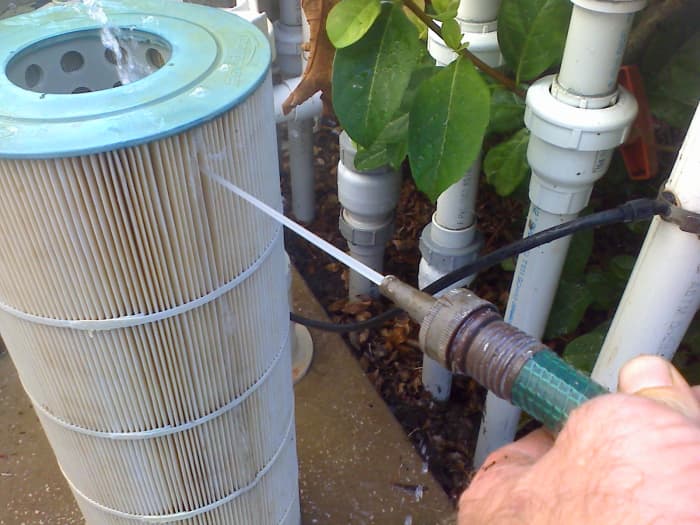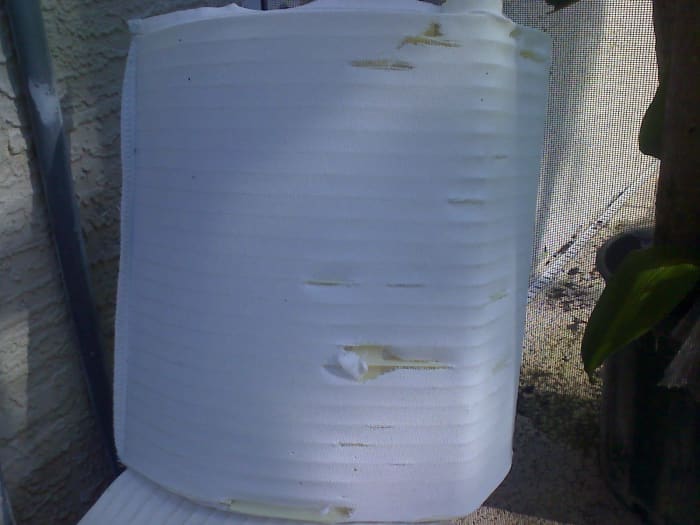What Is Pool Filter Sand Made of
Rob is a pool-service industry professional with over 20 years of experience.

The best pool filter depends on what kind of pool you have.
Juan Patlan
This question can only be answered on a case-by-case basis as each individual pool has different needs. Therefore, there are many factors that need to be considered before determining what filter is "the best." Factors such as pool size, seasonal climate conditions, frequency of use, and bather load. We will take a look at the most common pool filters used at a residential home. As a side note, a commercial or public pool will almost always have a DE filter.
First, we need to understand what a filter does. We all know it filters water. But how much bacteria or debris is it capturing? This is measured by microns. Each type of pool filter has a different amount of microns that can be captured. Even though chlorine will kill bacteria, the dead bacteria still needs to be filtered out. A bad filter can cause cloudy water. While technically safe to swim in a cloudy pool if the sanitizer or chlorine level is sufficient, who wants to swim in one?
To understand just how small a micron is and what each filter is capable of filtering, I will explain this first. One micron is 1/25,000 of an inch. A human hair measures between 30 and 120 microns. With that said, let's move on to the types of filters and how many microns they will filter.

rinsing a cartridge filter
Three Most Commonly Used Pool Filters
- Cartridge Filter - A Cartridge filter is a cylindrical filter that have a pleated filter material in which being pleated, maximizes the square footage of the filter. Cartridge filters can capture debris as small as 10-15 microns. Cartridge filters are the middle of the road as far as debris that can be filtered. They are the easiest to maintain and do a good job keeping the water clear. They need replaced normally about once per year. Cost of a replacement cartridge will vary based on the size, or square footage of the cartridge.
- Sand Filter - Sand filters extract impurities from the water using sand to collect the debris. Once this debris builds up the filter will need to be backwashed. Basically running the water in the reverse direction through the filter. These can filter debris between 20- 40 Microns, so not quite as good as a cartridge filter. They are very easy to maintain as they need backwashed once every several weeks. The sand will need changed only once every three or four years. They are very heavy and bulky though.
- DE Filter - Or "Diatomaceous Earth" This filter contains grids inside that are coated with DE powder, a filter media in which mined and fossilized exoskeletons of tiny diatoms are used in a powder form to coat the grids. This is backwashed similar to the sand filter, but unlike just backwashing alone, the filter always needs fresh DE powder added. A DE filter can trap debris as small as 2-5 microns.
Pros and Cons of Each Type of Filter
Advantages and Disadvantages of the Cartridge Filter
Advantages
- Low maintenance. As a pool service professional, a cartridge filter in my opinion is the easiest to maintain. Pop out the cartridge, rinse and you're done.
- Not a high cost to replace the filter once a year. These also do a very good job filtering water and maintaining decent water clarity. As stated above, it's the middle of the road as far as microns capturing debris. This is a good filter for a residential pool and highly recommended for a screen enclosed pool.
- Cost for a cartridge filter— element only, depending on size— runs between $65 and $150 (USD). Entire new filter with cartridge included, between $200-400.
Disadvantages
- If a pool has some problems such as algae or water cloudiness, these cartridges have a tendency to clog quickly when trying to filter cloudy or "green" water. The cartridge needs to be rinsed every few hours until the pool is clear. If the pool is maintained regularly and you don't have many algae issues, then I would certainly recommend this type.

Sand filter
Advantages and Disadvantages of a Sand Filter
Advantages
- These are becoming less popular in the residential market. A sand filter is ok for a pool that gets little use and is chemically maintained at all times. Very easy to backwash.
- Unlike a DE filter, nothing more is required than simply turning the valve to "backwash" and that's it. The flow is reversed and all of the debris is blown out.
Disadvantages
- A sand filter can only filter debris 20 - 40 microns. If you ever have a green pool problem and have a sand filter, forget it. It will take weeks to filter the cloudy water.
- They are very bulky. Not my favorite.

DE Filter

Torn DE Filter Grids
Advantages and Disadvantages of a DE Filter
Advantages
Read More From Dengarden
I am very partial to these for several reasons.
- Remember that a DE filter can filter debris as little as 2–5 microns. DE filters are sometimes known in the pool industry as "water polishers" because of the micron count.
- DE filters in my opinion are the best filter. If I had a small residential pool, my choice would be the cartridge filter because of the simple maintenance but a DE filter is amazing when trying to clear a cloudy pool. These filters capture everything. Unfortunately there are a few disadvantages to these filters as a homeowner.
Disadvantages
- High maintenance. The grids inside the filter will not last forever. They will need replaced every 2–3 years. (As a pool service company I charge around $285 for a full grid replacement.) You can order the grids online though and do it yourself for less than half the cost. Not very difficult to do the replacement.
- The DE filter needs to be taken apart normally once every 6 months to a year to rinse off the built up DE powder that normal backwashing will not get rid of.
- Grids will get holes in them after time allowing DE powder to shoot back to the pool. A new DE filter will exceed the cost of a new cartridge filter.
You may want to visit my article "How to clean and repair DE filter grids."
Conclusion
So what is the best filter? You now have the information needed to make that determination. The variables are many. Decide what your needs and budget are. Cartridge filters are becoming more widely used. There are actually new cartridge filter elements that are DE compatible now. As a pool service pro, DE filters are my top choice, but as a homeowner the cartridge filter is the best choice.
Happy swimming!
This article is accurate and true to the best of the author's knowledge. Content is for informational or entertainment purposes only and does not substitute for personal counsel or professional advice in business, financial, legal, or technical matters.
VKS on May 01, 2019:
Thank you for the article, it was useful. We have a large open pool (400 sq.mt of surface area) in a semi arid dusty environment. It has cartridge filter and the problem is too frequent clogging up, probably due to large pool catchment area. do you have any suggestions here ? Thanks in advance
Michael on April 18, 2019:
Thank You. The article was very informative and confirms my pool cleaners recommendation.
Rasul m. on August 01, 2018:
That was very helpfull! This article helped me choose the right filter.i also couldnt find cartridge filter micron ratio,so thank you for all information!
brookside pools on October 29, 2013:
What is the Best Pool Filter? great way to give customers a knowlede of different filters , and what is the best filter for there use, great page. coronabrooksidepoolservice.com
cartermadson on January 18, 2013:
Personally, I prefer sand filters. It seems to get things most clean. However, I wouldn't suggest a sand filter if there are lots of leaves and things that fall into your often.
What Is Pool Filter Sand Made of
Source: https://dengarden.com/swimming-pools/What-is-the-Best-Pool-Filter
0 Response to "What Is Pool Filter Sand Made of"
Post a Comment